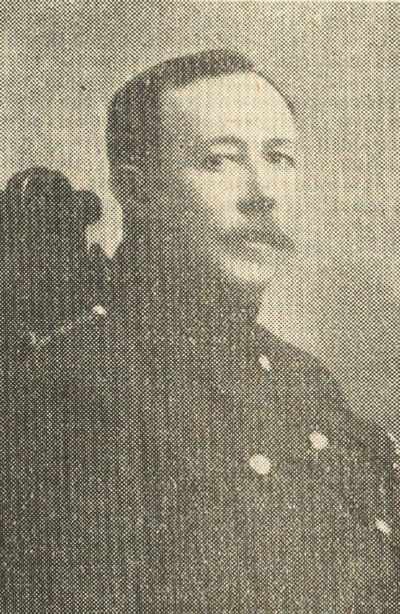Farrier Quartermaster-Sergeant James Mooney
James Mooney was born around 1859 at Moira, County Down, son of labourer John Mooney.
On 10 June 1878 he enlisted in the 5th (Royal Irish) Lancers at Belfast (No.2015). On 15 February the following year he transferred to the 17th (Duke of Cambridge's Own) Lancers (No.2285). Days later he embarked for South Africa, where he saw service in the Zulu War. Later that year he went with his regiment to India, remaining there until he returned home on 8 November 1888. By then he had reached the rank of farrier sergeant. At the end of the year he was discharged and entered the army reserve, his character recorded as 'very good'.
On 24 May 1889 Mooney married widow Jane McAdam (nee Kennedy). The couple had five children, as well as raising Jane's child from her first marriage.
With the outbreak of the Boer War, on 18 March 1901 Mooney enlisted in the 74th (Dublin) Company, 8th Battalion, Imperial Yeomanry (No.35491). He was immediately appointed to the rank of farrier sergeant. He embarked for South Africa with the company the following month, serving there for a year. On his return he was discharged as medically unfit for further service due to dental problems.
By 1911 Mooney was living with his children and step-son at 6 Frank Place, Belfast, and working as an iron works furnace man. His wife Jane had died the previous year.
On 25 January that year he enlisted in the North Irish Horse (No.565 – later Corps of Hussars No.71039). Although then aged 51, Mooney declared his age as just 29 years. It is hard to believe that the regimental recruiters did not know the truth, but his previous cavalry experience and his skills as a farrier would have made him a useful acquisition. According to North Irish Horseman Charles Trimble, while he and an officer were checking the enlistment paperwork in 1915, Mooney happened to enter the room:
"What is that first medal ribbon you are wearing?" Mooney was asked, and he replied – "The Zulu War, Major." "But here is your attestation form and it states that your age is 34. That war was fought before you were born".
Mooney was made farrier sergeant on 4 March 1911 and farrier quartermaster-sergeant on 17 February 1912.
On 2 February 1915 he faced a court martial at Antrim for neglecting to obey an order (s.11) and behaviour to the prejudice of good order and military discipline (s.40). He was reduced to the rank of corporal shoeing-smith. However three months later his quartermaster rank was restored.
On 4 April 1916 he married Annie Sterling of Antrim. His son James was killed in action on 7 June 1917 while serving with the 8th Battalion, Royal Irish Rifles.
Mooney did not see overseas service during the war. After a medical board hearing at Belfast, on 13 March 1918 he was discharged as no longer physically fit for war service (paragraph 392(xvi) King's Regulations).
He died on 17 March 1928. The Ballymena Weekly Telegraph reported:
The funeral took place on Monday afternoon of Mr. James Mooney, Inglerea Terrace, Antrim, to the family burying-ground at Moira. Mr. Mooney, who was in his 69th year, had an interesting Army career. ...
Mr. Mooney had been in his usual health up till a few days before his death, which occurred late on Friday night, and his passing removes one of the most popular and well-known figures in the Antrim district.
An enthusiastic member of the Orange Institution, he was Deputy Master of Skeffington L.O.L. 493 (Antrim). Many of the lodges in the district were represented at the funeral, and amongst those present were Br. F. T. Smith, , J.P., W.D.M.; Br. C. K. Anderson, D.M., Br. Thos. Dorragh, W.M., and Br. John Beggs, secretary of Skeffington L.O.L.
The chief mourners were:-- Mr. Edward Mooney (son), Samuel and William Mooney (brothers), Messrs. John and Thomas Mooney (cousins), Francey Mooney (nephew), Robert Shields (brother-in-law), and John McAdam (step-son). Canon Collis, B.D., vicar on Antrim, conducted a service at the house, and Rev. W. E. Hunt conducted the service at the grave-side. There were many floral tributes.
The funeral arrangements were carried out by Mr. James Baird, Church Street, Antrim, under personal supervision.
More images of Mooney can be found here and here.
Image from the Ballymena Weekly Telegraph kindly provided by Nigel Henderson, Researcher at History Hub Ulster (www.greatwarbelfastclippings.com).

